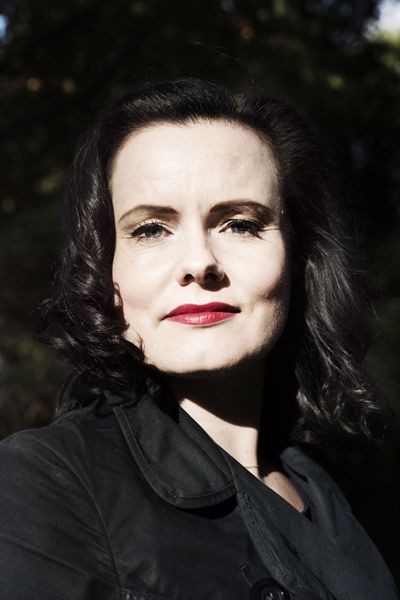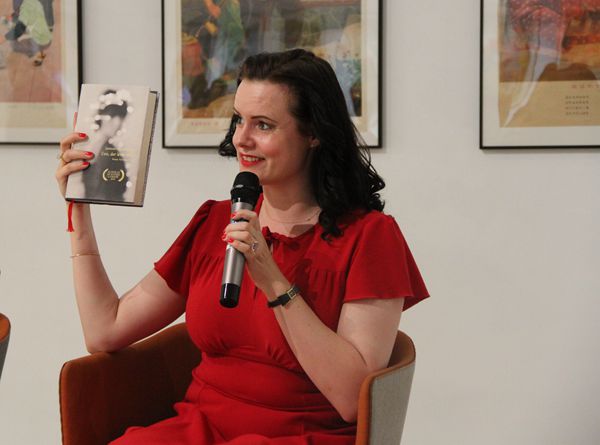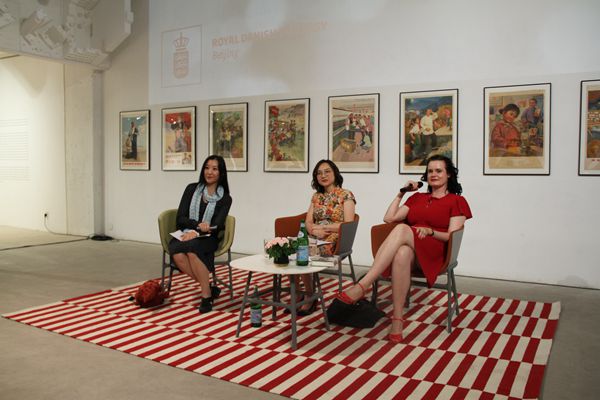Danish author and Chinese director discuss mother-daughter struggles
- By Jennifer Fossenbell
 0 Comment(s)
0 Comment(s) Print
Print E-mail China.org.cn, May 21, 2019
E-mail China.org.cn, May 21, 2019

The Danish Cultural Center and the Royal Danish Embassy recently co-hosted a talk bringing together best-selling Danish author Leonora Christina Skov and Chinese film director Yang Mingming to talk about the theme of mother-daughter relationships as reflected in their latest works.
The event was held last Thursday at the Danish Cultural Center in Beijing's 798 Arts District.
The Chinese cinema release of Yang's most recent film "Girls Always Happy" took place on May 15, after being premiered at the Berlin International Film Festival (usually known as the Berlinale) and gaining several awards on the international film circuit.
Skov's sixth novel, with the working English title "The Quiet Sense of Something Lost," was published last year, and has since sold 120,000 copies, winning the 2018 Golden Laurel, Denmark's most prestigious literary prize. It has been at the top of Denmark's best-seller list for 16 months, and has also been published in Swedish and Serbian.
The dialogue was moderated by Li Wenjie, professor of literary translation, comparative literature and Hans Christian Andersen studies at Beijing Normal University's School of Foreign Languages and Literature.
It is part of the Danish Cultural Center's ongoing "year of gender" and was billed as revolving around the themes of "love and injury, confrontation and acceptance between mother and daughter," which is embodied in these most recent works by the two artists.
A true-life tale of family loss
Skov read an extract from the first scene of her autobiographical novel in English translation, related to the final days of her mother's life. In the opening pages, the audience discovers that she has been estranged from her parents for many years, and that her mother cannot offer her acceptance or forgiveness, even while dying of cancer.
Skov explained that the book focuses on her life growing up in small-town Denmark, until she came out as a gay woman at the age of 21. Her parents disowned her and burned all her things and her mother later blamed her for the fact that she had developed cancer. The rest of the book is about her efforts to rebuild her life in Copenhagen, where she moved with her partner at the age of 21 to study and start over again.
Her novel, she said, tells the truth about an unhappy woman and a troubled relationship that was never mended. According to her, a mother's love should be unconditional, but sometimes that doesn't happen.
As for Yang, she said: "I'm not sure if unconditional love exists in this world." She made the point that not all women are capable of being good mothers, and it should be a careful decision for a woman whether or not to have children.

Reflecting family life in the hutongs
The trailer for Yang's film was screened at the event, giving the audience a sample of her latest creative work. Set in the hutongs of Beijing, with herself in the starring role, it explores the tumultuous relationship between a fictitious daughter and mother locked in a battle of wills and continue to hurt each other as they fight for control of their own lives. In the end, however, they find a path to a little more acceptance and empathy.
Yang explained that the film is not autobiographical, but was influenced by her own experiences, as well as her observations of people around her, especially growing up in the hutongs of Beijing.
She described her own relationship with her mother as complicated, revealing that, when her mother saw the trailer for her new film, her only comment was that she didn't like the dialogue.
However, Yang stressed, she respects her mother because she raised her as a single parent.
Discovering universal themes
Reception of both artists' works have exceeded their expectations. Yang was afraid her film was so grounded in traditional Chinese culture that audiences abroad wouldn't be able to relate to it.
"It's a black comedy," she noted. "It's funny and it's painful. It's funny because it's painful." She said audiences in North America and Europe laughed during the parts she thought were the most tragic, but she still felt that they related to the characters, and she has now become convinced such themes are actually universal.
As for her book, Skov said she had thought it would only appeal to a small community of readers in Denmark. "The way people have responded to the book has been overwhelming," she said. "I didn't expect this to happen."
From the more than 5,000 letters she received, many sharing their own stories, Skov has seen how many people identify with the kind of challenges she writes about. In the end, like Yang, she has realized that her personal story of struggle contains universal elements. Thousands of readers relate to the idea of starting over after hardship or loss, and about finding your own way in the world.
Healing through storytelling
Both artists had much to say about how the role of women in their families can create unhealthy dynamics. Skov explained that her father was the sole decision-maker and breadwinner, so her mother discovered how to use guilt to get her way. Yang echoed this, saying that the mother character in her film similarly learned to use her pain "as a weapon" to cause feelings of guilt and shame in her daughter.
However, Skov said, feminism and psychotherapy provide an avenue to deal with difficulties in a healthy way -- by talking about them. Speaking out as a strong woman has been essential to her, helping her to learn to always be honest with herself, and to face her problems head-on, and she hopes her book will encourage others to do the same.
Both artists concluded that both Chinese and Western societies lack cultural narratives about parents, especially mothers, struggling in their role as parents. That's why it was important to tell these stories and get people talking about it, so that they don't feel alone.
When the moderator turned the questions to the audience as well, several attendees offered their own personal stories and asked the two artists for advice.
Yang concluded that people can't choose their parents; what matters is what they choose to do with their own lives. Skov said the best thing she did was choosing to get away from the traumatic situation and find a supportive community that would accept her for who she was. She felt she was born to write books, and believes it is her destiny to share stories with other people.
On the subject of sharing her story more widely, Skov said in an interview with China.org.cn that her book, like most Danish literature, has not been translated into English -- a fact that she hopes will change. She said that after the publicity tours and readings for her current novel are finished, she'll begin work on a follow-up book that tells more of her own life story.
Skov is representing Denmark at the 4th EU-China International Literature Festival, now underway in Beijing through May 22. She came to China for the first time in 2014, when she wrote half of one of her previous books during a four-month writer's residency in Shanghai.







Go to Forum >>0 Comment(s)